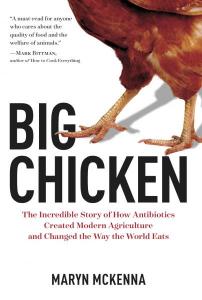Maryn McKenna: Big Chicken
OF HOW ANTIBIOTICS CREATED MODERN AGRICULTURE
AND CHANGED THE WAY THE WORLD EATS
Maryn McKenna
National Geographic Books/Penguin Random House, Sept. 12, 2017, $27.00
ISBN-10: 1426217668; ISBN-13: 978-1426217661
McKenna reports:
Big Chicken tells the tale of how animal agriculture turned to the routine use of antibiotics as growth promoters and disease preventatives in the 1950s, and how it clung to those practices despite decades of evidence the drugs were contributing to the rise of antibiotic resistance around the world. That story is told through the parallel story of the rise of modern poultry production, because chickens were the first animals to get growth promoters experimentally, and — at least in the United States — chicken may be the first protein to voluntarily exit routine antibiotic use.
The impetus for this book was my realization, while researching my last book, Superbug, that we use many times more antibiotics in agriculture than in medicine, something that didn’t make sense to me given how zealously medicine pushes conservation of antibiotics.The proposal went out in the summer of 2013, which turned out to be fortunate timing, as the FDA decided in December 2013 to act against farm antibiotic use, with a set of rules that became effective in January 2017. Editor Hilary Black of National Geographic Books saw the idea’s promise and outbid several other houses to buy it.
I began the book’s research with a project fellowship at the Knight Science Journalism program at MIT, which helped me to travel to the Netherlands, France, and around the U.S. I also benefit from being a Senior Fellow at the Schuster Institute for Investigative Journalism at Brandeis University, which uses its endowment to support student researchers for its fellows.
What I wish I’d known: That the story would change as I was reporting it, as U.S. consumers turned against farm antibiotic use. What I thought would be an exposé also became an account of cultural change. And also, that my most important historical sources would be not the digitized journals I rely on for stories, but old bound volumes of conference proceedings that I tracked down via used-book sellers. How I knew I needed them: I always read the footnotes.
Contact info:
- Maryn McKenna, 219-285-1175, marynmckenna@gmail.com, marynmckenna.com
- Book Websites: bigchickenthebook.com/; National Geographic Books/Penguin Random House: www.penguinrandomhouse.com/books/546760/big-chicken-by-maryn-mckenna/
- Agent: Susan Raihofer, 718-852-5542, sraihofer@dblackagency.com
- Publicists: Holly Watson, 310-390-0591, holly@hollywatsonpr.com; Ann Day, Ann.Day@natgeo.com
NASW members: will your book be published soon? Take advantage of this opportunity for shameless self-promotion. Submit your report for Advance Copy.
Tell your fellow NASW members how you came up with the idea for your book, developed a proposal, found an agent and publisher, funded and conducted research, and put the book together. Include what you wish you had known before you began working on your book, or had done differently.
See https://www.nasw.org/advance-copy-submission-guidelines.
Thinking of writing a book? If you are a NASW member, you may access a list of more than 150 books and online resources to help you craft your book proposal, find an agent and funding sources, negotiate your contract, learn about self-publishing, publicize and market your book, and more at https://www.nasw.org/article/write-book.
Send book info and questions about book publishing to Lynne Lamberg, NASW book editor, llamberg@nasw.org.


